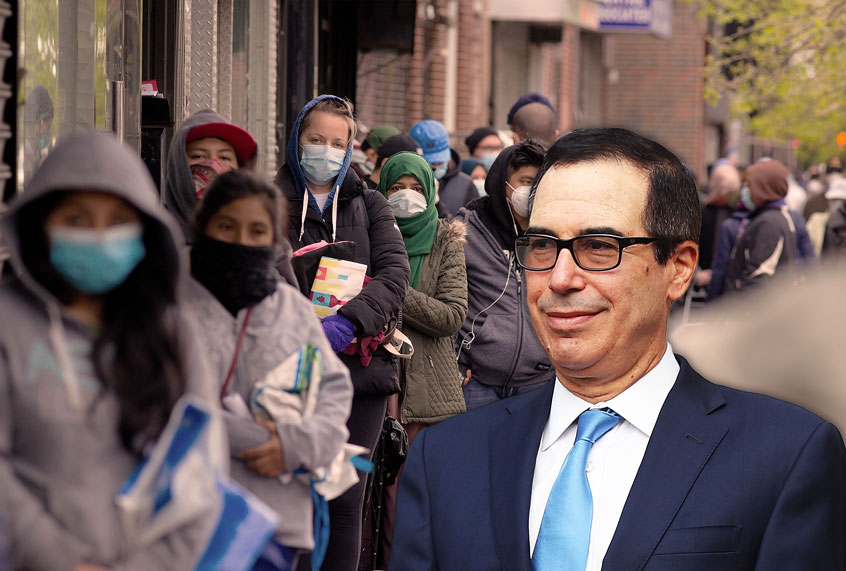One of President Donald Trump’s top cabinet officials told a reporter on Thursday that the Republicans’ coronavirus relief plan will include an enhanced unemployment insurance extension “based on approximately 70 percent wage replacement.” Presumably, that means that the unemployed would see 70% of their employed wages replaced through unemployment insurance, as experts articulated to Salon.
In his interview with CNBC, Treasury Secretary Steven Mnuchin offered glimpses of the economic plan being proposed by Republican leaders to address the pandemic-induced economic recession. One key provision of any relief plan will be extending enhanced unemployment insurance, which is scheduled to expire at the end of July. The current benefits provide an additional $600 per week on top of state unemployment insurance, although some Republicans were reportedly considering reducing the benefits to $100 per week through the rest of the year.
The rationale for the federal government supplementing unemployment insurance by $600, rather than supplementing it to total a worker’s full-time employed wage, was that such a percentage-based supplement would require so much more computational and bureaucratic work as to delay distribution by months.
House Majority Leader Steny Hoyer, D-Md., responded to Mnuchin’s comment by arguing that 70 percent wage replacement is not “the policy we ought to pursue” but that “it’s not a dealbreaker.”
“I think it means having the weekly [unemployment insurance] benefit capped at 70 percent of the wage at the lost job,” Austan Goolsbee, who served on President Barack Obama’s Council of Economic Advisers, told Salon by email. When asked about whether the 70 percent wage replacement plan would help people in need during the setback, Goolsbee replied that “cutting payments to individuals at a moment when the virus is resurgent and the unemployment rate is in double digits will threaten the recovery. I’m at least glad someone in the administration realizes that we need to maintain the safety net if we are going to keep bumbling the virus response.”
William Nordhaus, a professor of economics at Yale University, interpreted Mnuchin’s proposal in the same was as Goolsbee, telling Salon by email that the proposed policy “is definitely better than standard [unemployment insurance], which is closer to 50 percent replacement and has very limited eligibility. It is probably better than 120 percent replacement, which gives poor incentives to find a job. The main concern would be that people have free or low-cost health insurance when unemployed.”
Gabriel Mathy, a macroeconomist at American University, told Salon by email that there are deeper underlying problems with America’s unemployment benefits system.
“The root issue here is that the US system is so antiquated and decentralized that it must give fixed payments to workers,” Mathy told Salon. “[It] would be better to switch to a system of replacing X percent of wages using a federal [unemployment insurance] system. This would allow a political compromise which would result in more generous UI as payments could be closer to 100 percent without going over 100 percent as will occur when fixed lump sum payments are made to all workers, regardless of income.”
He added, “Seventy percent replacement rate is a big cut from the current situation, and would result in significant hardship for families. Expect a surge in defaults on payments/bills/loans/etc. from these cuts.”
The Republican relief proposal is expected to include another round of $1,200 stimulus checks to households whose pre-pandemic incomes meet the qualifying threshold, according to The Wall Street Journal. The bill will not include a payroll tax cut, even though the Trump administration had been pushing for that measure. Mnuchin said that it could be included in future relief legislation.
Mnuchin’s comments were made hours after Trump officials and Senate Republicans announced that they had reached a tentative deal about what that relief legislation might look like. The next step would be to enter negotiations with Democrats; because the House of Representatives is controlled by that party, Republicans will need to compromise with them in order for any relief measures to become law.
Before Republicans could release their plan on Thursday, however, they appeared to struggle when it came to figuring out how to write up the actual text of their legislative proposal. Democrats criticized Republicans for not moving with enough urgency and dismissed the idea of breaking the package into a series of smaller bills.
If Congress is unable to pass additional relief legislation before the unemployment benefits run out, the economic impact could be devastating. Democrats have criticized Republicans for seeming to drag their feet when it comes to providing economic relief, with Rep. Don Beyer, D-Va., releasing a statement earlier this month drawing attention to how delays harm ordinary Americans.
“Mitch McConnell may already have doomed the tens of millions of American workers who depend on enhanced federal unemployment benefits to a sudden, sharp decline in income at the end of July,” Beyer said in his statement.
He added, “Because state unemployment benefits need to be extended by July 25 in order to be processed by states administering their programs, McConnell’s announcement that the Senate will not even begin drafting or negotiating legislation until next week effectively makes a lapse in those expanded payments unavoidable. We may already be out of time to avoid the iceberg.”

